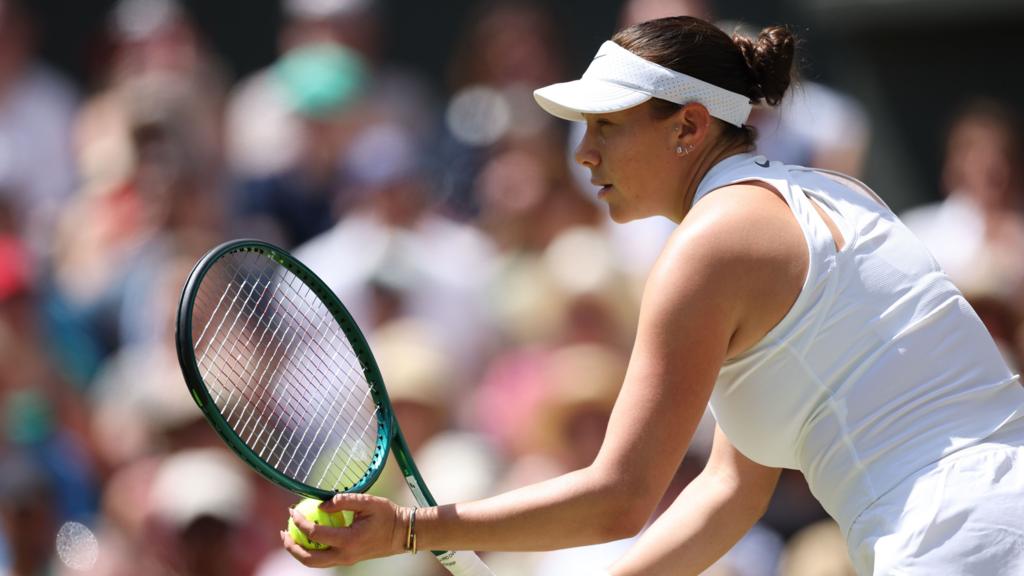This video can not be played
Anisimova: Hiatus from Tennis Proved Essential
Wimbledon 2025
Dates: 30 June-13 July Venue: All England Club
Coverage: Comprehensive live coverage across BBC TV, radio, and online platforms, including extensive streaming on BBC iPlayer, Red Button, Connected TVs, and the mobile app. Complete coverage details.
Prior to her ascent as a Wimbledon finalist, Amanda Anisimova was widely regarded as a prodigious talent poised for Grand Slam triumphs.
At just 17, she showcased her potential by reaching the semi-finals of the 2019 French Open, notably defeating defending champion Simona Halep and breaking into the world’s top 25.
However, four years later, Anisimova recognized the necessity for a break. Battling mental health challenges and burnout, she found the experience of attending tennis tournaments increasingly “unbearable.”
For months, she abstained from playing tennis, choosing instead to travel, spend time with friends and family, attend university in person for a semester, and remain detached from the sport until her passion was rekindled.
Now, she has stunned world number one Aryna Sabalenka to reach a first Grand Slam final.
“I gained valuable insights into myself, explored my interests outside of tennis, and simply took the time to breathe and experience a normal life for a while,” the 23-year-old shared with BBC Radio 5 Live before her semi-final victory.
“I’ve learned the importance of honestly listening to yourself, trusting your intuition, and heeding the signals your body sends.”
Sinner overcomes injury concerns to advance to semi-finals
Bencic stuns Andreeva, setting up semi-final clash with Swiatek
All British singles players eliminated from Wimbledon – Key takeaways
The demanding 11-month season requires players to traverse the globe, moving from one hotel room to another in pursuit of ranking points and prize money.
This is coupled with the psychological strain of attempting to break losing streaks, the pressure to secure Grand Slam titles, and the impact of abusive messages on social media.
Matteo Berrettini, who has spent three years battling injuries, described the “heavy” feeling of being on court, while world number three Alexander Zverev expressed a “lack of joy” both on and off the court and admitted to “never feeling this empty before.”
Andrey Rublev has openly discussed his struggles, telling the Guardian in January, external that he sought the help of a psychologist to manage the “crazy anxiety and stress of not understanding what to do with my life.”
He has also adopted a new perspective. While winning a Grand Slam was once Rublev’s ultimate goal, he now recognizes that it would not fundamentally alter his life. However, he also acknowledges the difficulty of creating distance from the sport.
“Ultimately, tennis is merely the trigger. It’s something within you that you need to confront,” Rublev explained.
“If you advise Sascha [Zverev] to take a break, it will be challenging for him. He would prefer to play. Similarly, it may not be easy for Casper [Ruud].”
Amanda Anisimova is into a second Grand Slam semi-final
Five-time major champion Carlos Alcaraz revealed in a Netflix documentary that his greatest fear is that tennis would become an “obligation.”
The relentless pursuit of success, the determination to secure that elusive Grand Slam, or to break a losing streak against a particular opponent can become deeply ingrained in an individual’s identity, making it challenging to distinguish where tennis ends and the person begins.
Alcaraz makes a conscious effort to enjoy himself both on and off the court. It is not uncommon to see him laughing after an exceptional point – even when facing difficulties against Fabio Fognini in the Wimbledon first round, he still managed to appreciate his opponent’s remarkable shot-making.
He has also spoken about the mental rejuvenation he experienced during his trips to Ibiza, despite his team’s initial reservations following his 2024 French Open victory.
“It’s about enjoying playing tennis, enjoying stepping onto the court, and not dwelling on the outcome,” the Spaniard stated.
“It’s simply about living in the moment.”
Australian Open champion Madison Keys has discussed the perspective she gained through therapy.
The American had previously worked with sports psychologists but found that focusing solely on sport “was not as helpful as I needed it to be.”
“From a relatively young age, our identity becomes deeply intertwined with being a tennis player,” Keys explained.
“While that’s positive, it can take a toll on how you perceive yourself as a person when you experience challenging weeks, months, or years on tour.
“Being able to explore that and understand how to separate the two and recognize that you’re not solely a tennis player, but a complete individual with numerous other valuable attributes and interests, was crucial for me.
“That, in turn, made the tennis aspect somewhat easier.”
Carlos Alcaraz is a five-time Grand Slam champion
Sabalenka engaged with a therapist for five years before feeling prepared to “take responsibility,” describing herself as “my own psychologist.”
She maintains open communication with her team, stating: “We can discuss anything. I know they won’t judge me.
“They won’t blame me. They’ll simply accept it, and we’ll work through it together.”
Anisimova believes that her hiatus was “a necessary thing” that set her on her current trajectory.
Since returning to the tour, she has secured the most significant title of her career at the WTA 1,000 event in Doha and has re-entered the world’s top 10.
She will now aim to take the final step and lift the Venus Rosewater Dish on Saturday.
“It was something I needed to do for myself,” she added.
“I definitely had to find my way back, really work on the fitness side, and get in my hours of training.
“It’s been a journey. I’ve finally rediscovered my game and my confidence.”
This video can not be played
Anisimova saves five set points to secure remarkable tie-break victory

